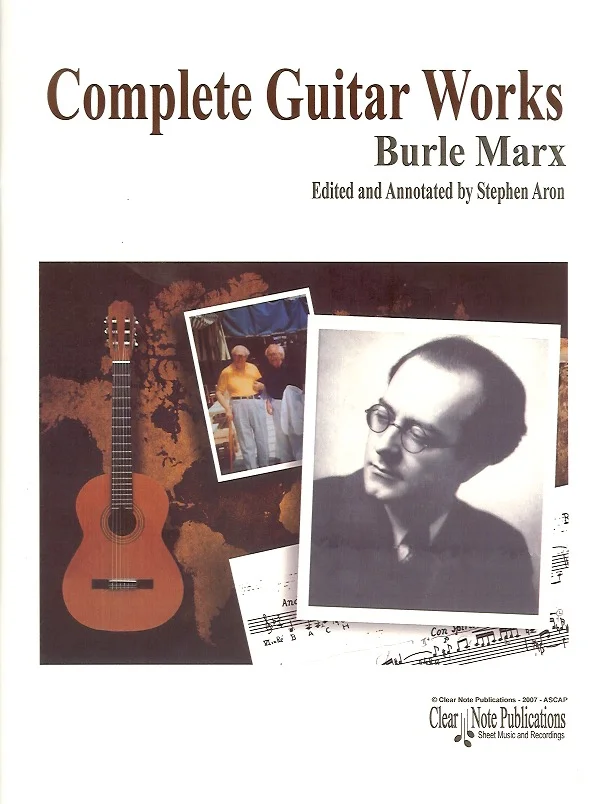Complete Guitar Works of Burle Marx
Complete Guitar Works of Burle Marx
"This is a book to be ignored at your peril. If this music or at least some of it is not played by lots of performers in the next few years, then there simply is no justice in the world of music...fascinating." (Classical Guitar Magazine)
Published by Clear Note Publications, 42p.
This music can be heard in its entirety on Stephen Aron's CD Brazilian Masterworks.
This folio of solo guitar works is a true discovered treasure. I had the good fortune to become friends with Madalena Burle Marx, the composer’s daughter, and her husband, James Ryon, when they lived in Akron, OH. Ryon was the oboe professor for many years at the University of Akron, and Madalena held the position of principal cellist with the Akron Symphony Orchestra, and played with many ensembles in the area. I enjoyed playing chamber music with both of them on several occasions. When the subject of her father’s guitar works came up, naturally, I was intrigued. They were written for Andrés Segovia, at the great performer’s suggestion; the two had a lasting friendship. Unfortunately, circumstances prevented their performance; instead, the scores languished, virtually unknown. I had the pleasure of premiering two of the works in 1989. After another lengthy hiatus, it is gratifying to finally see the entire collection emerge in print for the enjoyment of the entire guitar community.
Guitarists will quickly discern here a deep resource for the serious performer. The shorter works, Mr. B-A-C-H Visits Brasilia and Saudade do Nosso Amigo are compelling, beautifully drawn compositions which satisfy on many levels. They are melodically memorable, harmonically inventive, and structurally mature works which will easily find a place in the repertoire. The collection of short dance-style works, Violeiros de Guaratiba, shows Burle Marx’s less serious side. Even here, though, numerous subtle and surprising details keep the pieces from sounding like familiar Brazilian pop instrumentals. They are delightfully tuneful, rhythmically catchy, and always comfortable to play. The masterwork in the collection, the Saga do Medievo, is an extraordinary and important find for guitarists. Made up of over forty variations on a ground, it rivals Ponce’s Folias Variations in several ways. Burle Marx employs a breathtaking range of techniques and compositional devices to keep this work in motion. Its careful construction and inventive, often quite complex episodes belie its accessibility. This work is sure to find its way into the repertoire of serious concert artists.
Burle Marx’s compositions all show a sophisticated understanding of compositional technique. Throughout the works, though, the guitarist will delight in the pieces’ playability. He wrote extremely well for the instrument; much of this music is of intermediate level. Further, while the European influence on his compositional style is evident throughout, so is his Brazilian heritage. All of these works are clearly Brazilian. This, to my mind, is one of their greatest qualities. In many ways, Burle Marx achieved the same thing as his countryman, Heitor Villa Lobos: a convincing synthesis between the classical idiom and folkloric elements. It is my pleasure to help bring his guitar music out of obscurity, and my hope it will attract the notice it certainly deserves.
Stephen Aron

